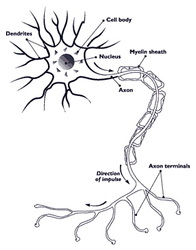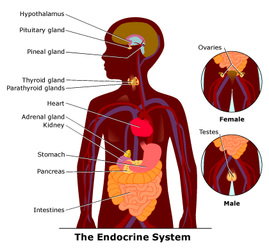The human body is a living thing. Because the nervous system is apart of the human body, it must follow the 10 COL's in order to take care of it's many jobs and and functions. The nervous system also works hard to maintain balance, or homeostasis, in the body at all times. We will now explore how the wonderful nervous system does all these miraculous things to keep the body going, by sending messages to the brain and alerting the body.
Characteristics of Life
Regulation: The nervous system responds to changes in the external/internal environment, meaning the system is in charge of controlling the body. The COL that the nervous system follows is mainly regulation, but other COL's like transport, are performed in this system.
Homeostasis and Corresponding Systems
Maintaining Homeostasis in the Nervous System
The environment is constantly changing, and your receptors are what pick up those changes. In order for your body to preform homeostasis throughout this, it does things to adapt to the body's surroundings. to maintain homeostasis the body adapts. For example, your body's regular temperature is 98.6 degrees Fahrenheit. When your environment changes and the temperature rises, your body will sweat to try to bring your temperature back down to it's normal state. When the climate becomes really cold, your body will shiver in order to bring your temperature back up to 98.6 degrees Fahrenheit, or your body's homeostasis. Your receptors are connected to cells, then those cells send the signal to your spinal cord, which then sends the signal to your brain. Next, the brain will tell your other body systems to react, for example by releasing a certain hormone.
How does the Nervous System Correspond with other Systems?
Other systems in the human body depend on the nervous system in order to carry out even some of the simplest jobs. For example, the endocrine system is in charge of knowing when to secrete hormones into the body system, and things called glands help do this. However, the glands don't know when to send the hormones into the body until the brain, found in the nervous system, gives them the "thumbs up" to send out hormones. The nervous system is able to do this because it preforms regulation, and when it knows what to do and what messages to send, the endocrine system is able to react to it. Another system that can't function without the nervous system is the excretory system. urine in the bladder, for example, can't stay there forever, the urine will eventually have to be pushed out and excreted. But, the question is, how and when does your body know when to go? Well, as your bladder fills with urine, it swells to a bigger size. This is the indication it is ready to be released. So, tiny nerves centered in your hollowed out organ send a message from the excretory system to the nervous system, signaling to the brain it is ready to come out. These are just a few examples of what systems correspond with the nervous system.


